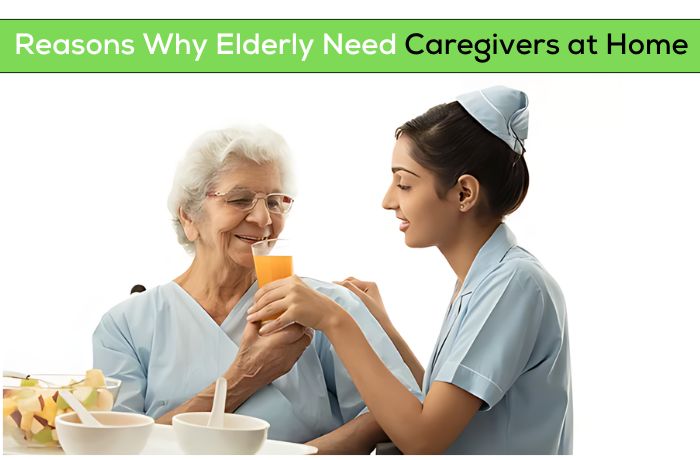As our loved ones age, they often face physical and emotional challenges that make everyday tasks difficult. Many older adults prefer to remain in the comfort of their own homes, where they feel safe and surrounded by memories. However, they often need assistance to maintain their independence and health. This is where caregivers step in to provide valuable support. In this blog, we’ll explore why older adults need caregivers at home and provide tips for caring for older adults.
Understanding the Need for Home Care for the Elderly
As people age, their bodies and minds change. These changes can make even simple activities, like walking or remembering to take medications, a challenge. For many older people, living at home without help can be risky. The need for home health care arises from several factors:
- Physical limitations: Weakness, arthritis, or mobility problems can make it difficult to get around the house or take care of personal hygiene.
- Mental decline: Memory loss or conditions such as dementia can make it difficult to remember daily tasks or medications.
- Chronic health conditions: Many older adults have conditions such as diabetes or heart disease that require regular monitoring.
In-home caregivers provide the support seniors need to continue living at home while receiving help with these daily challenges.
Reasons Why Elderly Need Caregivers at Home
1. Safety and Fall Prevention
Falls are a leading cause of injury for seniors. Simple tasks like getting out of bed or going to the bathroom can be dangerous. A caregiver helps reduce these risks by providing physical assistance and keeping the home environment safe. They can help with mobility, remove hazards such as loose carpets, and make sure the home is well-lit.
2. Assistance with activities of daily living
Everyday activities, also known as Activities of Daily Living (ADLs), such as bathing, dressing, cooking, and cleaning, can become difficult as people age. Caregivers help seniors with these tasks to ensure they stay clean, healthy, and well-fed. This assistance helps maintain a senior’s dignity and independence.
3. Medication management and health monitoring
Many older adults take multiple medications, which can be confusing to manage. Missing doses or taking the wrong medication can lead to serious health problems. A caregiver can keep track of medications, remind the senior when to take them, and even coordinate doctor visits. This type of support is critical for seniors with chronic conditions that require ongoing medical attention.
4. Companionship and emotional support
Loneliness is a significant problem for seniors, especially if they live alone. Social isolation can lead to depression and a decline in overall health. Caregivers provide companionship, a friendly face, and someone to talk to, which improves the senior’s emotional well-being.
Specialized care for chronic conditions
Some older adults suffer from serious conditions such as dementia, Parkinson’s disease or stroke. These conditions require specialized care that family members may not be trained to provide. Professional caregivers are often trained to meet the specific needs of seniors with these health problems, ensuring that they receive the best possible care at home.
Tips for Caring for Older Adults at Home
If you’re caring for an elderly family member at home, here are some helpful tips to ensure their well-being:
1. Create a safe environment
Start by making the home safe. Remove tripping hazards such as loose rugs or clutter, install grab bars in the bathroom, and provide good lighting throughout the home. Consider installing a medical alert system for emergencies.
2. Encourage physical activity
Even light exercise can have tremendous benefits for older adults, helping to improve strength, flexibility, and mental well-being. Encourage your loved one to participate in activities such as walking, stretching, or simple chair exercises. Always consult a doctor before starting a new exercise routine.
3. Create a routine
Routines provide structure, which is especially important for older adults who may be struggling with memory issues. Try to create a daily schedule that includes regular meal times, medication reminders, and time for activities such as reading, watching television, or spending time outdoors.
4. Monitor your health regularly
Keep an eye out for any changes in your loved one’s physical or mental health. Regularly monitor their vital signs, weight, and eating habits. If you notice any unusual changes, contact their healthcare provider immediately.
5. Provide nutritious meals
Proper nutrition is essential to maintaining good health, especially as we age. Make sure your loved one eats a balanced diet that includes fruits, vegetables, whole grains, and lean protein. If cooking is difficult, consider preparing meals in advance or using a meal delivery service.
When to Seek Professional Caregiving Services
Sometimes caring for an elderly loved one becomes too much for family members to handle. Here are some signs that it may be time to seek professional help:
Your loved one’s medical needs become too complex to manage.
- They require 24-hour supervision for safety reasons.
- The family caregiver is experiencing burnout or stress.
- The senior is becoming more isolated or depressed despite your best efforts.
Professional caregivers can provide the support you need to ensure your loved one is safe, healthy, and emotionally cared for.
Care Givers Pune: Trusted Care for Elderly in Fatima Nagar
For those living in Pune, especially in areas like Fatima Nagar, Care Givers Pune offers reliable elderly care services. Their team of trained caregivers provides personalized support to seniors, from assistance with daily tasks to specialized care for chronic conditions. If you’re looking for compassionate caregivers who can help your elderly loved ones remain comfortable and safe at home, Care Givers Pune is a trusted option.
Ensuring Quality Care for Seniors at Home
Caring for older adults requires patience, understanding, and often professional help. By ensuring that your elderly loved ones have a safe environment, regular routines, and proper medical care, you can help them maintain their quality of life. If caring for them becomes too much for you, don’t delay in hiring professional caregivers who can provide the extra support you need.
Remember, taking care of our elderly loved ones is a way to show gratitude and love for all they’ve done for us throughout their lives.



